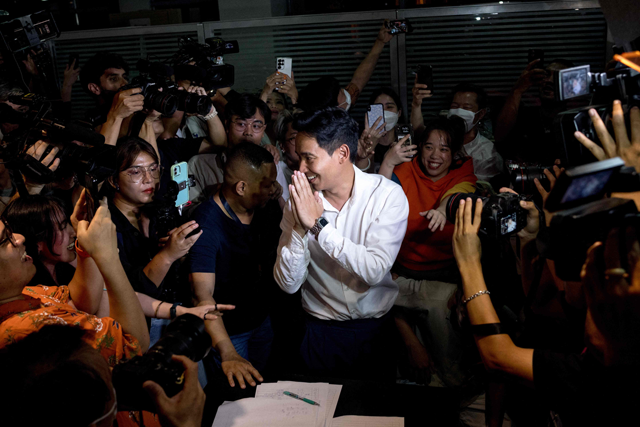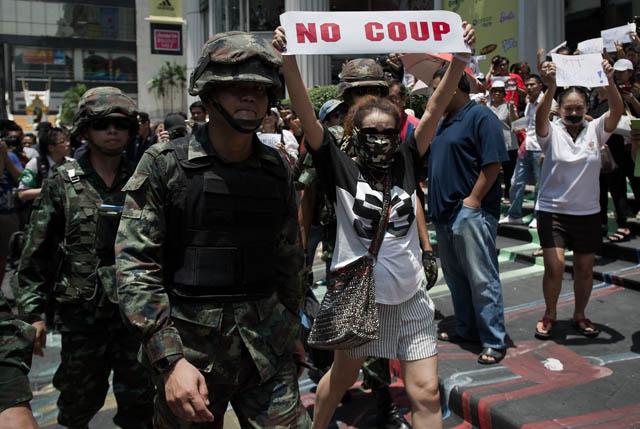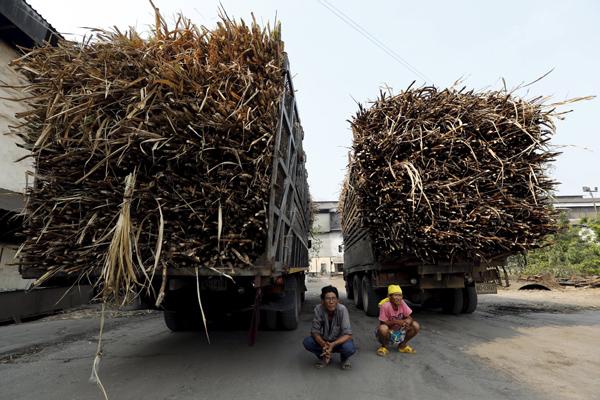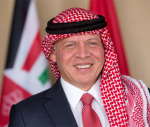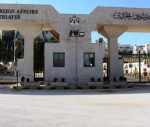You are here
Victory for generals as Thais vote for junta charter
By AFP - Aug 07,2016 - Last updated at Aug 07,2016
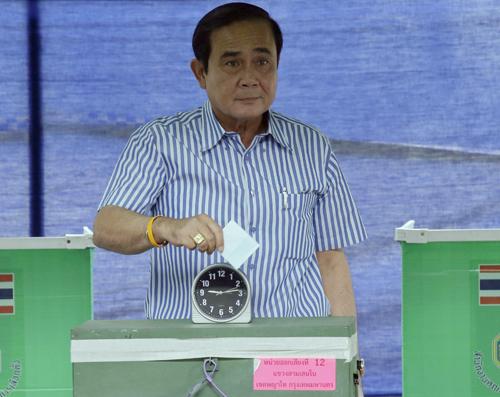
Thailand's Prime Minister Prayut Chan-O-Cha poses as he casts his vote in a referendum on a new constitution at a polling station in Bangkok, Thailand, on Sunday (AP photo)
BANGKOK — Thailand voted Sunday to approve a junta-scripted constitution, preliminary results showed, in a boost to the army's political aspirations and a body blow to the country's stuttering pro-democracy movement.
The military says its new constitution will curb endemic political corruption, bring stability after years of unrest and pave the way for a general election next year.
But critics say it aims to neuter civilian politicians and introduce a tethered democracy under the stewardship of the military and its royalist allies.
Partial results released by the Election Commission late Sunday showed 62 per cent of voters had approved the charter, with 90 per cent of votes counted so far.
Authorities gave a subdued turnout estimate of 55 per cent of Thailand's 50.2 million registered voters, after a poll run-up that saw independent campaigning and open debate barred. Official results will be released Wednesday.
Sunday's referendum was the first time Thais have been able to go to the polls since former army chief Prime Minister Prayut Chan-O-Cha toppled the elected government of Yingluck Shinawatra in 2014.
The kingdom is split after a decade of political turmoil that has damaged growth, seen democracy shunted aside and left scores dead in rival street protests.
A triumphant junta leader Prayut Chan-O-Cha, who has struggled for two years to convince many Thais of his ability to unite the country, swiftly hailed the win as a step towards "a bona fide democracy" free from graft.
In a terse message released through the prime minister's office, he also hit out at "interference by foreign elements" using "malicious intent", without naming the parties.
The United States, European Union and United Nations all criticised the junta's bar on debate and campaigning in the lead up to the poll.
RIP Democracy
In a hint at the country's stark divisions, pro-democracy social media users were quick to lament a result that kicks back aspirations of a return to full civilian rule.
One Twitter handle called RIP_Thailand said:
"RIP democracy, completely stepping into army dictatorship," it read.
But Jatuporn Prompan, leader of the anti-junta Red Shirt movement, struck a defiant note.
"I want to tell Prayut that your victory is nothing to be proud of as your opponents had no chance to fight," he told reporters, referring to the ban on campaigning before the vote.
The preliminary results illustrated the kingdom's bitter geographic divide.
Only the impoverished, rural northeast — a region that has voted in droves for successive Shinawatra governments turfed out by the army — and the deep south — hit by a Muslim insurgency — voted against the charter.
But millions came out in favour of the military's charter, especially in the capital and the south.
Jostling elites
Thailand has a long history of turbulence.
The military has successfully seized power 12 times since the end of absolute monarchy in 1932 and this constitution will be the kingdom's 20th.
But the latest chapter in the political crisis — dubbed the "lost decade" — has been particularly painful.
Since a 2006 coup toppled Prime Minister Thaksin Shinawatra, Yingluck's billionaire brother who is now in self-exile, power has flipped between elected governments linked to him and rule by the army and its establishment supporters.
Shinawatra parties have won all general elections since 2001, scooping up votes by promising greater wealth and opportunity to the nation's poor.
Sunday marked the Shinawatras' first loss at the polls for 15 years.
The country's tensions have been compounded by the frail health of 88-year-old King Bhumibol Adulyadej, as elites jostle ahead of the transition.
Junta opponents believe the charter will further warp democracy and deepen the divides.
The most contentious clauses call for a junta-appointed senate — including six seats reserved for military commanders — to check elected lawmakers and increased powers for courts, which are already accused of political bias.
Another clause makes it easy to begin impeachment proceedings, while a new proportional representation voting system could produce weak coalition governments.
"The coup makers tore up the old constitution and robbed us of our rights, promoting themselves to control the government," “No” voter Ohm Kontaogan, 35, told AFP in Bangkok.
Prayut had promised to hold elections in the summer of 2017, whether or not the charter was passed.
But his previous election date promises have slipped.
Related Articles
BANGKOK — Thai opposition parties dominated the early vote count in Sunday's national elections, in what was shaping up as a huge rejection
Thailand’s ruling junta warned protesters it would not tolerate any further rallies against its coup after tense standoffs Sunday between soldiers and angry crowds, and said demonstrators would be held for one or two days, but could be jailed for up to two years if they kept taking to the streets.
BANGKOK — Thailand needs to do more to keep its tourists safe if it wants to achieve its objective of attracting more high-end travellers, o


